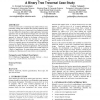Free Online Productivity Tools
i2Speak
i2Symbol
i2OCR
iTex2Img
iWeb2Print
iWeb2Shot
i2Type
iPdf2Split
iPdf2Merge
i2Bopomofo
i2Arabic
i2Style
i2Image
i2PDF
iLatex2Rtf
Sci2ools
113
click to vote
ACMSE
2006
ACM
2006
ACM
Framework design using function generalization: a binary tree traversal case study
A software framework is a technology that enables software reuse, potentially yielding rich dividends but requiring significant longterm investment. However, a framework is not a panacea because it is more difficult to design than a single application. Systematic approaches seek to make framework design more convenient and less error-prone. This paper illustrates the function generalization approach to framework design by developing a framework for binary tree traversals. A binary tree traversal is a well known algorithm, which makes it an excellent example. The approach involves a systematic process for generalizing a fixed application expressed as Haskell functions to produce a set of functions that precisely describe the generalized application. This generalized application encompasses various common and variable aspects of a family of applications. By using design patterns as a guide, the resulting set of functions can be converted to a Java framework. Categories and Subject Descr...
ACMSE 2006 | Binary Tree Traversal | Framework Design | Theoretical Computer Science | Tree Traversal |
Related Content
| Added | 13 Jun 2010 |
| Updated | 13 Jun 2010 |
| Type | Conference |
| Year | 2006 |
| Where | ACMSE |
| Authors | H. Conrad Cunningham, Yi Liu, Pallavi Tadepalli |
Comments (0)

